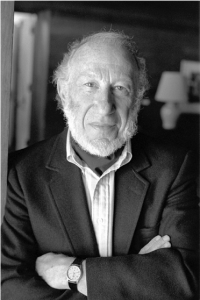NISS ‘Statistics Serving Society’ Forums on Gun Violence Honor Ingram Olkin
Ingram Olkin (1924–2016) was a principal founder of the National Institute of Statistical Sciences (NISS) and an internationally known statistician whose work stressed the importance of statistical thinking when studying major societal problems. He was professor emeritus and chair of statistics and education at Stanford University. Ingram was also admired for his inclusive mentoring approaches with junior researchers under his care and even individuals he had just met. In particular, he was known as an advocate for improving the status and number of women in academia.
Ingram’s daughter, Julia Olkin, professor of mathematics at Cal State – East Bay, continues to support this spirit of caring and scholarship through her work with NISS. With the help of Julia and many others, NISS honors her father’s memory by sponsoring the newly formed Ingram Olkin Statistics Serving Society (S3) forums.
These forums intend to engage scientists and stakeholders in addressing the challenging issues facing contemporary society and exploring the roles statisticians and data scientists can play.
NISS is reconfiguring the Ingram Olkin Forum committee and seeking individuals interested in pursuing the distinctive hallmarks of inclusivity and societal impact through scholarship Ingram Olkin espoused by helping to identify and plan future forums. The NISS Ingram Olkin Committee looks to host additional events concerning topics having serious impact on society. Information about the gun violence workshop and future events, including event recordings, is available on the NISS website.
Inaugural Forum Focuses on Gun Violence
The inaugural S3 Forum was a two-day workshop held in Alexandria, Virginia, June 26–27. With the cooperation and support of the ASA and Statistical and Applied Mathematical Sciences Institute (SAMSI), this forum examined gun violence and invited statisticians to contribute to its understanding.
That gun violence persists as a vexing problem in the US needs little explanation. Numerous foundations and organizations have recognized more research is needed since adequate information and insight is lacking about the ownership and use of firearms, the causes and consequences of their use, and the effects of interventions and technological innovations. The sociological context and implications on health and law enforcement involve a variety of disciplines, and the spectrum of questions that arise affect policymakers at all levels. Implicit is that obtaining adequate information and understanding requires more research, data of high quality, and incisive analyses.
To address the twin concerns of adequate data and informative analysis, this forum assembled a working group consisting of criminologists and sociologists with experience in gun violence issues and statisticians with interest in and expertise to tackle these concerns. The program suggested there are many problems that beckon an increasing number of statisticians to get involved.
Emerging Data Sources
At the forum, both Erica L. Smith of the Bureau of Justice Statistics and Jonathan Lewin of the Chicago Police Department spoke about available data sources related to gun violence. The Department of Justice has a number of data collections available for use, but many challenges exist for obtaining reliable information from them. Exploiting recent innovative high-tech investments, the Chicago Police Department has begun systematically collecting, analyzing, and acting upon the data it collects regarding gun usage.
Trends in and Policing Gun Violence
A number of presentations provided participants with a broader understanding of the types of investigations underway related to gun violence. Criminologists Charles Loeffler of the University of Pennsylvania and Rick Rosenfeld, Janet Lauritsen, and Ted Lentz of the University of Missouri-St. Louis all presented research evidence on how gun violence relates to the societal factors concerning both the perpetrators and victims of gun violence and the work needed to unravel these relationships. Philip J. Cook of Duke University described the importance of better investigations of shootings and differences in the reports depending on the existence of a fatality. And in a talk related to successful identification of shooters, Heike Hofmann of Iowa State University described recent advances in analyzing the striations on bullets as a means of identifying a unique source.
Assessing Gun Violence Risks and Evaluating Initiatives / Police Shootings
A number of presentations addressed the efforts and initiatives underway and programs in place to better understand these investigations. These speakers included the following:
- Terry Schell of the RAND Corporation, who identified the best models and their assumptions
- John MacDonald of the University of Pennsylvania, who described a randomized place-based controlled experiment demonstrating reduced gun violence
- Yifan Zhang of Stanford University, who talked about the LongSHOT initiative
- Jens Ludwig of The University of Chicago, who spoke about working with the Chicago Police Department
- David Hemenway of Harvard University, who reported on work investigating the use of firearms by police officers across states
- Greg Ridgeway of the University of Pennsylvania, who presented work analyzing the characteristics of officers involved in shootings
Roundtable Working Groups
After each session, participants took part in roundtable groups to discuss the presentations and consider additional research needed to improve the available evidence. The results from these discussions and the outcomes of the forum will be presented in a forthcoming white paper.
The principal purpose of the Ingram Olkin S3 forums is to highlight an important issue and the opportunities for statistical involvement. It was clear this first forum was able to engage a substantial number of criminologists, statisticians, and others to begin thinking about and working to make connections across disciplinary lines that will help in understanding and mitigating the effects of gun violence.


















